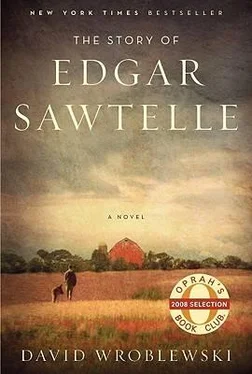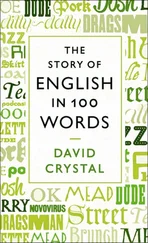Now, if that isn’t a curse, the man said, what is?
Before Edgar could answer, he heard Henry’s car pulling up the drive. Edgar took off his gloves and walked into the sunshine. He had to kneel next to Tinder and put his hand against the dog’s deep chest to restrain him as Henry climbed out of his car, and he and Tinder watched while Essay and Baboo circled and jumped.
THAT NIGHT HENRY OFFERED to drive them into town. Edgar said no. But Henry had long since deduced that Edgar didn’t want to be seen. He pointed out that they could drive around in relative safety after dark. The idea took Edgar by surprise-he was so used to traveling by day and bedding down at night, it hadn’t occurred to him, not even when he’d stood looking at the car back at Scotia Lake. When nightfall came, he relented. They loaded the dogs into Henry’s car, a brown sedan with a capacious but slippery back seat. Edgar made Tinder sit on the floor up front. Baboo and Essay scrabbled to balance themselves on the back seat.
“How long has it been since you’ve been in a car?” Henry asked, as he eased down the driveway. Then he looked alarmed. “Wait a second. When’s the last time these dogs were in a car? Is this going to make them puke?”
Edgar shrugged, grinning.
“Great,” Henry said. “You’re cleaning it up if they do. Deal? Otherwise I’m turning this thing around right now.”
Before he could gripe any more, Baboo leaned forward from the back seat and slobbered in Henry’s ear.
“Aw, god,” Henry said. “I hate it when they do that.” But he didn’t really hate it. Edgar could see that. Anyone could see that.
Out on the blacktop, they headed toward town. The headlights caught dandelions leaking up through the cracks in the asphalt. They passed a culvert over a creek where the moon’s reflection wobbled between the cattails.
Lute was a crossroads town, its one intersection controlled by a stoplight swinging like a lantern from crisscrossed wires. On each corner sat matching two-story brick buildings, like four old-timers crouched around a pan of beans. A Rexall drug, Mike’s Bar and Grill, a True Value hardware, and the Lute grocery.
“Closed up tight after five,” Henry said, waving a hand at the buildings. “Society life begins at six thirty, when Mike’s opens.” On that night, society life consisted of the three cars in the tavern’s small parking lot, lit by the otherworldly glow of the Pabst Blue Ribbon sign (“finest beer served…anywhere!”) hanging over the door.
On the far side of town, the pale chambered heart of the Lute water tower hovered in the night sky, tethered to the earth by four metal legs and the central stalk of its drainpipe. Once in the countryside, they drove without destination, wherever Henry wanted to go, and Henry wanted to go north. Henry liked to drive fast. That surprised Edgar, but it pleased him, too. He’d forgotten the weight of acceleration. They coursed along a maze of back roads. Essay and Baboo slid across the slick back seat when Henry powered around curves. Marshes and forests and lakes flashed by. Tinder craned his neck to see out the window. Headlights approached like balls of white flame. Their speed compressed the scent of the night into a dense, algal perfume that roared through the windows. Henry spun the radio dial, looking for distant AM stations-Chicago, Minneapolis, Little Rock. The signal cracked with the heat lightning over Lake Superior.
At the outskirts of Ashland, with its downtown lights and police cars, Henry swung the car onto the shoulder and shot away from town by an entirely different route, past shanties set back from the road. He paused by a bog that glowed eerily when he shut the headlights off. When they arrived at the railroad tracks, Edgar looked at the bluff to his right, and realized they’d made the round trip. They retired to a pair of lawn chairs. Henry drank a beer and then another and then he walked to the old wreck of a car.
“Tell you a secret,” he said. “This car was here when I moved in. I may have bought the place just to get the car.”
This was certainly news to Edgar. He’d been walking past the vehicle for days without deeming it worthy of a closer look. It sported a broad hood and headlights shaded by exaggerated brow ridges. The front fender sloped toward the rear wheels in a long arc while a compensating ridge developed into a tail fin. But whatever grace of form the car had once possessed was gone. Its body was so thoroughly dented it looked as if someone had beaten it, savagely, with its own tire iron. Rust had consumed major continents from the rear quarter panels. The chrome of the elaborate, two-tiered front bumper was dull as ore. And of course, the vehicle lacked tires-it levitated above the gravel on shadowy cinder blocks. All in all, the car gave the impression of an animal that had crawled to within inches of its lair before expiring.
“The vehicle at which you are now looking, um, at,” Henry said, sweeping his arm as if addressing an awestruck crowd, “is a 1957 Ford Fairlane Skyliner, the first retractable hardtop convertible ever made in America. No car looked like it before or since. Even the fifty-eight looks different-Ford messed up this beautiful bumper and grill for no reason. This is one of a kind.”
Henry patted the car’s side mirror with pride. It fell away and dropped to the ground. “Darn it,” he said. He snatched up the mirror and jiggled the bolts back into the corroded holes.
“It’s a little dinged up,” he said, “but watch this.” He opened the driver’s-side door and pulled a lever and the trunk popped open, hinged backward, near the rear bumper. Henry wrenched the trunk hood up, casually at first, then applying more effort, grunting and scrabbling his feet against the gravel. He circled the car, unsnapping latches. The metal roof separated from the body. It folded halfway into the trunk and then caught. “This is supposed to be electric,” Henry said over his shoulder, “but there’s no battery.” Then he reached into the back seat, withdrew a hammer, and beat unmercifully on a hinge. The roof dropped into the trunk cavity with a final metallic screech that temporarily silenced the night birds. Henry slammed the trunk shut and turned to Edgar, triumphant but panting.
“So you see why I can’t just sell this car. There’s so much potential here. Some guy offered to buy it for parts last summer, but I couldn’t let it be torn apart. I explained all that to Belva, but it made zero impression. She said it was an eyesore-which, I admit, okay, it is, now. But ordinary? I don’t think you can say that.”
Henry had gotten himself wound up talking about the Skyliner, but he stopped and shook off the idea with a shake of his head. “Who am I trying to kid,” he said.
No, Edgar signed. You’re right. It isn’t ordinary.
Henry peered at him, gisting the sign.
“You think?”
Edgar nodded.
“I can never tell anymore,” he said. “When my guard is down, I forget. I slide right back to ordinary, and I don’t even see it.”
He walked to the lawn chairs and together they contemplated the Skyliner.
“I almost took you to the police station tonight, Nat,” he said. “You probably should know that.”
Edgar shook his head and smiled. No you didn’t.
“Oh yes. There was a moment when I thought, ‘All I have to do is turn left at the next stop and we’ll be at the Ashland police station.’”
The shed’s not done.
“Yeah, the shed saved you,” Henry said. “This time. Better figure out how to stretch things out, is my advice.”
They’d reached the limit of Henry’s ability to read sign, and Edgar picked up the newspaper.
You couldn’t have forced us inside, he wrote. We’d have just run.
Читать дальше
Конец ознакомительного отрывка
Купить книгу












